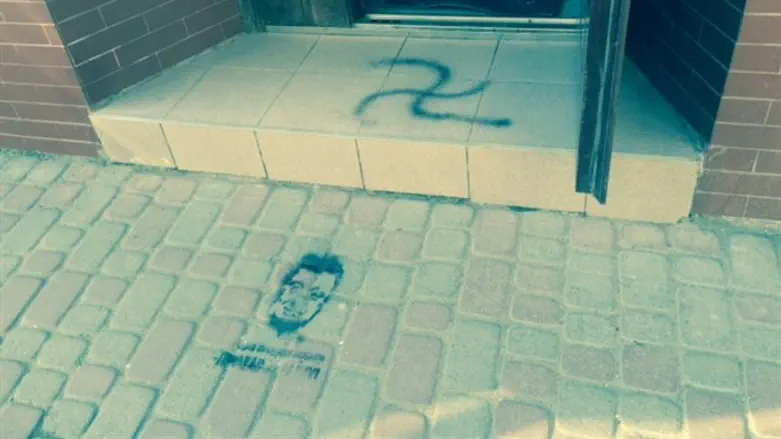
The World Zionist Organization (WZO) has conducted a comprehensive internet survey in recent months, ahead of the International Day to Combat Anti-Semitism, which will take place on January 27.
The comprehensive survey included 1,363 Jewish participants who do not reside in Israel. The full results of the survey will be presented by Yaakov Hagoel, WZO’s deputy director, at a conference on anti-Semitism to be held in Jerusalem this coming Thursday.
Respondents were asked how safe they felt in their place of residence given their Jewish identity. The results are encouraging: In Europe, only 27% of the respondents said they do not feel safe, and in North America only 11% feel insecure, despite growing anti-Semitism in the region.
In Europe, the number of respondents who do not feel safe in their area of residence is twice as high as the number of those living in the North American region and those in the rest of the world. In fact, one out of every four Jews in Europe does not feel secure in their place of residence, compared with one in ten who feels that way in North America.
Respondents were also asked how safe they felt about moving around with visible Jewish symbols such as a kippah and a Star of David, or using their Jewish name.
51% of respondents in Europe said that they do not feel safe to be seen with Jewish symbols, more than twice as many as respondents in North America, where 22% said they did not feel safe doing so.
The survey revealed that one out of every two Jews in Europe and one out of every four Jews in the world feels the need to conceal his Jewishness and avoid the most basic Jewish symbols. There is a gap between Jews' general sense of security and whether they feel safe to display Jewish symbols.
30% of those who responded that they felt safe in their area of residence testified that they did not feel confident about walking around with Jewish symbols. It can be concluded that the sense of security they reported exists only on the condition that they refrain from using their Jewish identity.
Respondents who said they had been exposed to an anti-Semitic incident were asked what type of incident it was. The survey revealed an increase in incitement in the media and on social networks, and this type is the most common - 80% of respondents from around the world and 81% of European respondents testified that they were exposed to anti-Jewish incitement of this kind.
70% percent of respondents around the world said they experienced or witnessed an anti-Semitic incident characterized by verbal violence and insults, 27% witnessed an anti-Semitic event characterized by threats, and 11% were exposed to an anti-Semitic incident characterized by physical violence. In Europe, about 29% of the respondents testified that they had experienced or witnessed an anti-Semitic event characterized by vandalism.
Most of the respondents who experienced an anti-Semitic incident did not report it. When asked why, 6% responded that they did not report for fear of their lives and their security, 30% preferred not to make a deal of it, and 42% said they had no faith in the local law enforcement authorities. This data supports and reinforces the claim that anti-Semitism has become part of the daily lives of Diaspora Jews.
Respondents who chose "other" (35%) cited the lack of reporting on claims such as "anti-Semitism is too widespread to report. It is best to deal with it alone", "Nothing will be done about it in any case", "The people who hurt me will say it was a joke", "It's a person to whom I am close and I did not want to destroy the relationship", and "I was afraid that they would fire me".
The survey also revealed that 59% of respondents around the world think that the politicians in their country are anti-Semitic to a certain extent.
In addition, respondents were asked to provide their opinion on the UN resolution not to recognize that Jerusalem is the capital of Israel. 72% said they believed it was an anti-Semitic resolution, while 13% considered it a legitimate decision.
Hagoel said that "the worrisome results of the survey prove once again that anti-Semitism has not disappeared from the world and that all necessary measures must be taken into consideration in order to eradicate it.”
"The writing was and still is on the wall - Diaspora Jews suffer from manifestations of anti-Semitism, many of them are afraid to demonstrate their Jewishness, believe that the politicians in their country are anti-Semitic and do not report incidents of anti-Semitism that have become routine. One of the worrisome figures is the lack of trust that the Jewish residents have in the enforcement authorities. This is a serious problem that every government must pay attention to," he continued.
"It can be seen that there is a congruence between the mood on the international public agenda and the incidents of anti-Semitism taking place in the world, in their frequency and character. The World Zionist Organization will continue to fight the ugly phenomenon, not only on the International Day to Combat Anti-Semitism, which we mark sadly, but every day of the year and with all the necessary strength, and will continue to strengthen Jewish pride among the Jewish people," stressed Hagoel.
